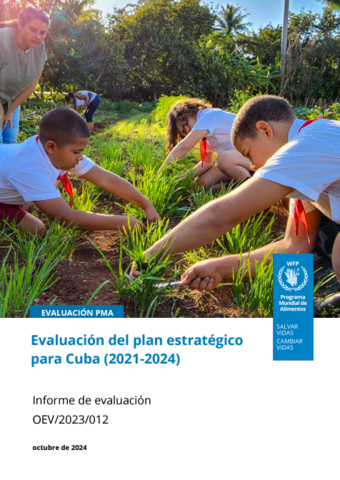
WFP is recognized as a trusted partner of the Government in Cuba, particularly in the areas of risk management, emergency response, food security, nutrition support and, lately, social protection strengthening. Its proactive and collaborative approach within inter-agency groups and the implementation of integrated projects have been instrumental to its strategic positioning. The country strategic plan was relevant to the country’s development challenges and coherent with the United Nations sustainable development cooperation framework, focusing on the Sustainable Development Goals related to zero hunger and partnerships.
Through ongoing dialogue with the Government of Cuba and leveraging its technical expertise, WFP adjusted and adapted its planning processes to meet the growing needs of the country. This flexibility and agility further solidified WFP's position as a key player in supporting national efforts in Cuba. However, data gaps hampered the identification of the most socioeconomically vulnerable people and WFP’s ability to monitor the results of its interventions.
Through coordinated efforts with various authorities and the United Nations country team, WFP was effective in its emergency response in Cuba, ensuring that people facing multiple hazards had access to food during disasters; there is nevertheless room for improving inter-agency complementarity in the area of emergency response.
Nutrition initiatives focused on enhancing the nutrition status of targeted population groups by promoting diverse and nutritious diets; challenges exist, however, particularly with regard to import limitations on food supplements, which affected the depth of WFP coverage.
WFP resilience-focused activities showed positive results, with a change in attitudes towards healthy eating and increased production and sale of agricultural products achieved through the short food supply chain scheme, a model linking agricultural producers to the national safety nets system. Challenges were encountered, however, in efforts to scale up the model and contribute to the implementation of the food and nutrition security law.
Through capacity strengthening, WFP played a crucial role in emergency preparedness and coordination and in supporting national efforts to address challenges related to poverty and quality of life.
WFP took significant steps to mainstream gender considerations in its interventions, but while efforts were made to prioritize equitable access to food and promote economic empowerment, transformational changes have yet to be achieved. Gaps also exist in addressing the needs of young people and in relation to the environment.
WFP demonstrated commendable promptness in emergency response thanks to the pre-positioning of food and non-food items. However, significant delays caused by exogenous factors – including the availability of maritime transport and project approval processes – hindered the full implementation of the country strategic plan.
WFP successfully achieved economies of scale through the short food supply chain model, leading to improved efficiency and opportunities to scale up the approach. Collaboration with government entities and the United Nations country team was vital in overcoming implementation challenges and showcasing the importance of strategic solutions to ensuring efficiency and effectiveness in WFP operations in Cuba.
Key factors contributing to WFP’s performance in Cuba included solid partnerships with the Government (including its scientific development institutions) and United Nations entities along with the presence of skilled and highly committed personnel who enabled efficient implementation, coordination and support, particularly during crises.
On the other hand, operations were hampered by challenges in resource mobilization, delays in administrative and logistics processes, limited access to data needed to improve targeting and accurately measure intervention results, and significant staff turnover among WFP counterparts.
Addressing these gaps will be crucial to strengthening WFP’s positioning in terms of long-term development issues and enhancing inter-agency coordination in project design and implementation, along with the retention of talent.



